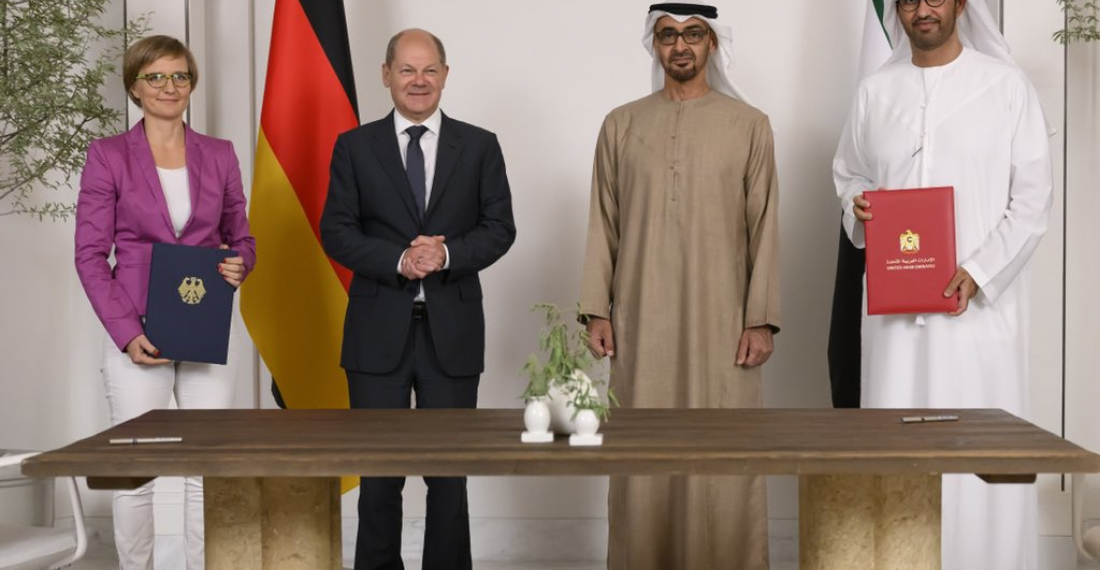The United Arab Emirates (UAE) and Germany signed a "landmark agreement" on Sunday (25 September) aimed at accelerating joint efforts to boost energy security, decarbonisation and combat climate change.
The major deal was struck in the presence of UAE President, Sheikh Mohammed bin Zayed, and German Chancellor Olaf Scholz, who is currently visiting the Emirates.
The new Energy Security and Industry Accelerator Agreement was signed by Dr Sultan Al Jaber, Minister of Industry and Advanced Technology and the UAE's climate change envoy, and Dr Franziska Brantner, Germany's Parliamentary State Secretary at the Federal Ministry for Economic Affairs and Climate Action.
Sheikh Mohamed spoke of the "close friendship and strategic partnership" the two countries enjoy in a post on Twitter after the deal was finalised.
Under the international partnership, Abu Dhabi National Oil Company (ADNOC) will supply German energy company RWE AG with liquefied natural gas cargo towards the end of the year. This will be used in Germany’s floating LNG import terminal at Brunsbuttel.
Adnoc has also reserved a number of other LNG cargos for German companies in 2023.
The deal secures the delivery of 137,000 cubic meters of LNG to be sent to the new LNG terminal in Brunsbüttel near Hamburg in December.
According to the dpa news agency, the amount included in the first delivery equates to around 0.95 billion kilowatt hours of electricity. However, the LNG deal can only make up for a small part of the 56.3 billion cubic meters of gas that Germany received from Russia in 2020.
"We need to make sure that the production of LNG in the world is advanced to the point where the high demand that exists can be met without having to resort to the production capacity that exists in Russia," the chancellor said before the deal was reached.
Scholz is being accompanied by a large delegation of German business leaders whose firms are particularly vulnerable to gas shortages this winter.
Germany is also on the lookout for sources of green hydrogen produced using renewable energies that it may hope to source from the Gulf.
Under the international partnership, Abu Dhabi National Oil Company will supply German energy company RWE AG with liquefied natural gas cargo towards the end of the year. This will be used in Germany’s floating LNG import terminal at Brunsbuttel.
Adnoc has also reserved a number of other LNG cargos for German companies in 2023.
Adnoc has entered into a series of agreements with German firms for demonstration cargos of low-carbon ammonia, a carrier fuel for hydrogen that can play a critical role in supporting decarbonisation.
It was also announced that Adnoc had completed the UAE's first direct diesel delivery to Germany this month and has agreed terms with Wilhelm Hoyer GmbH & Co. KG (Hoyer) to supply up to 250,000 tonnes of diesel per month next year.
The UAE and other countries across the Middle East and North Africa region are pursuing plans to incorporate hydrogen in their energy mix and tap into the clean fuel for different industrial applications.
Both countries expect to work in tandem on further opportunities to boost growth in the growing hydrogen sector.
The alliance will also involve leading UAE renewable energy firm, Masdar, exploring opportunities in the offshore wind markets in the North Sea and the Baltic Sea in Germany. This will be with the aim of generating up to 10GW of renewable energy production capacity by 2030.
"This landmark new agreement reinforces the rapidly growing energy partnership between the UAE and Germany," Dr Al Jaber said.
"As we embrace the energy transition, Adnoc is fully committed to accelerate and invest in projects of energy security, decarbonisation and climate action as we continue to be a responsible and reliable provider and trusted exporter of low-carbon energy."
Mr Scholz said: "I welcome the signing of the joint declaration of intent on the "Energy Security and Industry Accelerator - Esia.
"Through Esia, we enable the swift implementation of strategic lighthouse projects on the focus areas of renewable energies, hydrogen, LNG and climate action."






